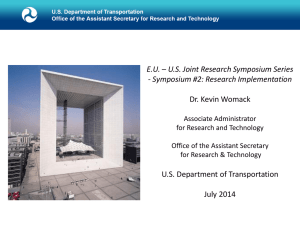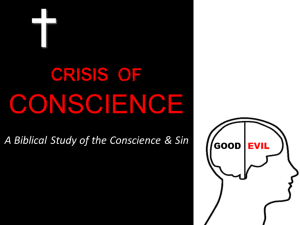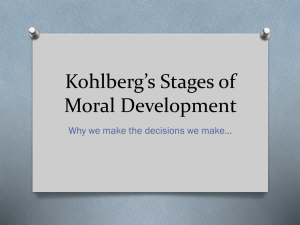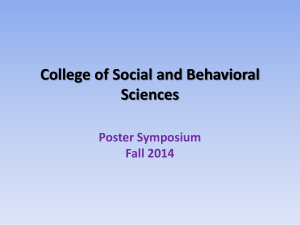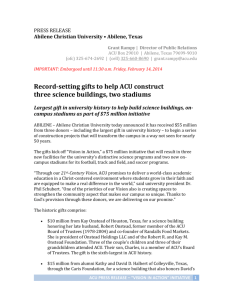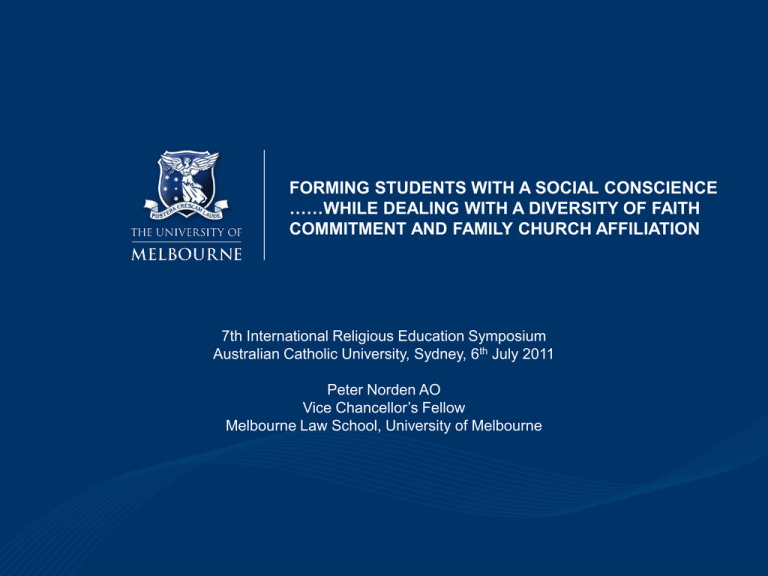
FORMING STUDENTS WITH A SOCIAL CONSCIENCE
……WHILE DEALING WITH A DIVERSITY OF FAITH
COMMITMENT AND FAMILY CHURCH AFFILIATION
7th International Religious Education Symposium
Australian Catholic University, Sydney, 6th July 2011
Peter Norden AO
Vice Chancellor’s Fellow
Melbourne Law School, University of Melbourne
ACU Symposium: Forming Students with a
Social Conscience
• Opportunities and Challenges in
religious education today
• Thinking back to school chaplaincy role
• Inner city parish primary schools…
• Catholic Secondary School Board
Member
• University of Melbourne and RMIT
University: teaching and mentoring
ACU Symposium: Forming Students with a
Social Conscience
• Three Stories to illustrate the
challenges:
• Indigenous disadvantage and
citizenship
• Recent “white flight” from Struggletown
• Mission of providing access to all…
scholarships
ACU Symposium: Forming Students with a
Social Conscience
• Observations and key policy issues:
• What are the “meeting places” with our
students today?
• A commitment to social justice
• A belief in the protection of human
rights
• How to become more effective, given
the diversity of faith commitment and
religious affiliation of our families?
ACU Symposium: Forming Students with a
Social Conscience
State
ACT
NSW
VIC
QLD
SA
WA
TAS
NT
TOTAL
Schools
30
585
488
278
107
158
37
15
1,698
Catholics
17,132
236,654
179,913
104,584
44,584
60,170
12,830
4,668
660,591
Total nos
60,166
1,107,336
819,103
629,771
248,815
334,050
82,376
37,003
3,318,620
ACU Symposium: Forming Students with a
Social Conscience
• The positive learning environments of
Catholic schools today:
• Successful introduction to the
community of Christian values
• Generally high standard of liturgical
celebration and ritual
• But what about reinforcement in the
home?
ACU Symposium: Forming Students with a
Social Conscience
• Experiential learning tasks and
community service programs:
• Great opportunities for personal growth
• Formation of values approach to
everyday life situations
• How to build more solidly on explicitly
christian values when there is little
modeliing of this from many of their
families?
ACU Symposium: Forming Students with a
Social Conscience
• Elements of an effective community
services program:
• Exposure to wider sections of the
community
• Introduction to disadvantage and
disability beyond previous associations
• Substantial time and personnel
commitment to reflection and evaluation
ACU Symposium: Forming Students with a
Social Conscience
• Youth leadership and youth
responsibility:
• Great opportunities within catholic
school environment
• But how to provide opportunities beyond
the school context?
• Substantial changes are required to
make this possible.
ACU Symposium: Forming Students with a
Social Conscience
• Models of authority and leadership
within church:
• How to encourage lasting engagement
and commitment?
• Authority needs to be decentralised
• How assess the lasting impact of World
Youth Day?
• Substantial youth leadership and
responsibility….
ACU Symposium: Forming Students with a
Social Conscience
• Do Catholic schools engage or manage
the “youth culture”?
• Listening to the experience of the young
• Being prepared for non-conformity and
innovation
• Danger of confining and
compartmentalising
ACU Symposium: Forming Students with a
Social Conscience
• Exclusion policies of many Catholic
Secondary Schools:
• External conformity v. internal
commitment
• Authentic student leadership and
commitment: a case example….
ACU Symposium: Forming Students with a
Social Conscience
• Lessons from the church’s social
services field:
• KEEPING THEM CONNECTED (2005)
• NOT SO STRAIGHT (2006)
• Widespread support and involvement of
catholic education sector
• Exclusion or inclusion….?
• Apparent lack of transparency at times
ACU Symposium: Forming Students with a
Social Conscience
• KEEPING THEM
CONNECTED
(2005)
• Expulsion,
suspension, or just
“transferred”
• Critical in Catholic
high schools that
risked damage to
their “corporate
reputation”
ACU Symposium: Forming Students with a
Social Conscience
• NOT SO STRAIGHT
(2006)
• Best practice to be
found in Catholic
secondary schools
• Some instances that
compromised values
of compassion and
respect and
Christian service
ACU Symposium: Forming Students with a
Social Conscience
• Credibility of the church’s teaching
about justice:
• Critical nature of consistent application
of values
• Opportunity for engagement with the
lived experience of our students
• Danger of mere external conformity
• Serious engagement with “the youth
culture” and christian values
ACU Symposium: Forming Students with a
Social Conscience
• Catholic schools setting a lead in
respect and dignity:
• Providing a safe, diverse and respectful
learning environment
• Students cannot learn and develop
unless they feel safe and respected
• No room for inconsistency between
stated “mission” and the lived
experience on the ground
ACU Symposium: Forming Students with a
Social Conscience
• Threats to consistency and
transparency in Catholic values:
• Mismanagement of child sex abuse
scandal within the church
• Sexual expression inextricably tied to
procreation alone
• What about those not within a church
sanctioned marriage commitment?
A.C.E. National Disability Conference
• CONCLUDING COMMENTS:
• How to continue to form students with a
social conscience?
• How to engage them beyond the school
gates with the church community?
• Greater engagement with the lived
experience of young people
• Roles and relationships and models of
leadership need to grow
A.C.E. National Disability Conference
• CONCLUDING COMMENTS:
• Apply courage and honesty in selfevaluation
• Exclusionary policies towards women in
the church
• Encourage youth to be leaders, not just
followers
• Develop a more respectful, inclusive
and positive view of sexual expression
A.C.E. National Disability Conference
• CONCLUDING COMMENTS:
• Future of enormous opportunity for
growth and development
• Depth and quality of the lives of the
young people engaged within Catholic
education today
• These resources must be harnessed
and allowed to take responsibility
© Copyright The University of Melbourne 2008


